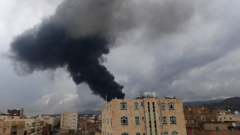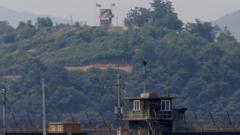As Israeli military actions escalate, concerns over the safety and humanitarian plight of nearly one million Palestinians in Gaza City are mounting. Reports indicate relentless explosions, with significant casualties reported in the last 24 hours. This recent surge in violence comes as Israel prepares for a more extensive offensive amid deteriorating conditions for the beleaguered civilian population.
Escalation in Gaza: Concerns for Civilians Amid Israel's Military Operations

Escalation in Gaza: Concerns for Civilians Amid Israel's Military Operations
Intense Israeli bombardment targets Gaza City as the humanitarian crisis deepens for almost a million residents.
Israeli forces have intensified strikes on Gaza City, asserting that these operations are part of a broader strategy to dismantle Hamas following the tragic October 7 attack, which left thousands affected on both sides. Local residents describe a bleak reality filled with constant fear as both aerial and ground assaults hit various neighborhoods, complicating an already dire humanitarian situation. Official figures suggest tens of thousands have been killed or injured in the ongoing conflict, sparking international alarm and criticism of Israel's military tactics.
Israeli Prime Minister Netanyahu remains firm in his stance against Hamas, facing internal pressures not only from families of hostages but also from international actors concerned about the humanitarian fallout of his military approach. Efforts to negotiate a ceasefire and secure the release of hostages continue to falter as Israel demands comprehensive deals rather than partial agreements.
As negotiations remain stalled, the United Nations warns that the offensive will have catastrophic humanitarian consequences, predicting a severe famine that has already begun to impact thousands. With critical infrastructure heavily damaged, and hospitals struggling to operate, the situation for Gaza's civilians grows increasingly precarious.
While regional actors pursue a truce, the Israeli military has stated an intention to potentially evacuate Gaza City's residents, raising additional concerns around civilian displacement and safety. As conflict ensues, the world watches with bated breath, hoping for a resolution that prioritizes humanitarian needs without sacrificing the pursuit of security.
With hopes for a peaceful resolution dwindling, the humanitarian implications of ongoing military operations underline the urgency for comprehensive dialogues that address both security and humanitarian concerns in the region.
Israeli Prime Minister Netanyahu remains firm in his stance against Hamas, facing internal pressures not only from families of hostages but also from international actors concerned about the humanitarian fallout of his military approach. Efforts to negotiate a ceasefire and secure the release of hostages continue to falter as Israel demands comprehensive deals rather than partial agreements.
As negotiations remain stalled, the United Nations warns that the offensive will have catastrophic humanitarian consequences, predicting a severe famine that has already begun to impact thousands. With critical infrastructure heavily damaged, and hospitals struggling to operate, the situation for Gaza's civilians grows increasingly precarious.
While regional actors pursue a truce, the Israeli military has stated an intention to potentially evacuate Gaza City's residents, raising additional concerns around civilian displacement and safety. As conflict ensues, the world watches with bated breath, hoping for a resolution that prioritizes humanitarian needs without sacrificing the pursuit of security.
With hopes for a peaceful resolution dwindling, the humanitarian implications of ongoing military operations underline the urgency for comprehensive dialogues that address both security and humanitarian concerns in the region.

















